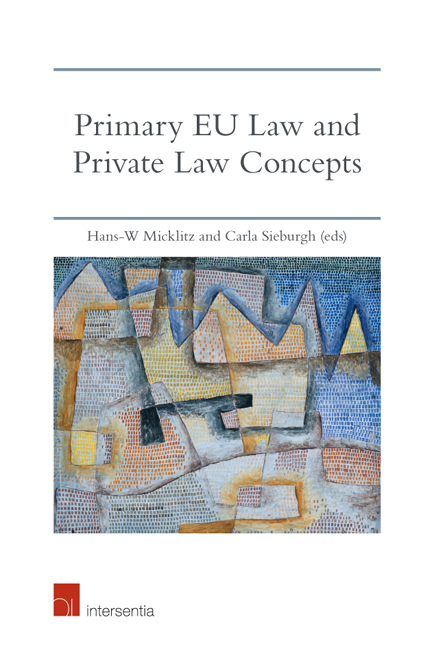Book contents
- Frontmatter
- Preface
- Summaries of the Chapters
- Contents
- Table of Cases: Alphabetical
- Table of Cases: Chronological
- List of Authors
- Chapter 1 Primary EU Law and Private Law Concepts
- Chapter 2 The Impact of Free Movement of Goods and Services on Private Law Rights and Remedies
- Chapter 3 The Impact of Free Movement of Capital on Private Law
- Chapter 4 The Impact of Competition Law on the Private Law Concepts of Nullity and Damages
- Chapter 5 The Impact of Article 101(2) TFEU Nullity on Private Law
- Chapter 6 The Impact of EU State Aid Law on National Private Law
- Chapter 7 The Impact of EU Intellectual Property Law and the Charter on Private Law Concepts
- Index
Chapter 1 - Primary EU Law and Private Law Concepts
Published online by Cambridge University Press: 27 September 2018
- Frontmatter
- Preface
- Summaries of the Chapters
- Contents
- Table of Cases: Alphabetical
- Table of Cases: Chronological
- List of Authors
- Chapter 1 Primary EU Law and Private Law Concepts
- Chapter 2 The Impact of Free Movement of Goods and Services on Private Law Rights and Remedies
- Chapter 3 The Impact of Free Movement of Capital on Private Law
- Chapter 4 The Impact of Competition Law on the Private Law Concepts of Nullity and Damages
- Chapter 5 The Impact of Article 101(2) TFEU Nullity on Private Law
- Chapter 6 The Impact of EU State Aid Law on National Private Law
- Chapter 7 The Impact of EU Intellectual Property Law and the Charter on Private Law Concepts
- Index
Summary
INTRODUCTION
The present chapter provides an explanation of the field of research, its background, the approaches to studying it and its aspirations. On the basis of discussions, exchanges and collaboration with the chapter authors, meetings with the authors, commentators and the editors and past, current and future research of the editors we add observations presented around four important concepts of private law: (i) the person (section 4); (ii) property (section 5); (iii) contract and tort (section 6); and (iv) remedies (section 7). In section 8 we shed light on lines of development and reasoning within current EU private law which to our understanding build an explanatory framework and determine the direction of the debate in the near future. The (no longer surprising) finding is that in issues governed by primary internal market law, internal market interests tend to prevail over other interests. Primary internal market law transforms private law and horizontal legal relationships. This, however, is not the full story. At the same time expectedly and unexpectedly, room is created for further transformation. Once market freedoms become integrated, they open the door to the introduction of fundamental rights issues. In their turn, fundamental rights related interests may be relied upon to open up the market. In intellectual property law, the fundamental right to information of third parties is introduced in order to grant access to the market while it limits the property rights of the intellectual property right-holder. Also for other parts of internal market law, the European Court of Justice (‘Court of Justice’) covers in its reasoning a broad spectrum of interests. The result is, for example, an interaction between the freedom of speech and the freedom of establishment.
It is crucial to stress the double consequence of the instrumentalisation of private law. The introduction of internal market law in horizontal relationships provides for a chance to introduce fundamental rights issues. The relation to the open market enables judges and parties to review a horizontal relationship against a broad spectrum of interests. Therefore it is possible that interests derived from human rights, including the social, will be (re-)embedded. State aid law provides for another example. EU law requires restoration of state aid illegally granted. It does not require more than restoration.
- Type
- Chapter
- Information
- Primary EU Law and Private Law Concepts , pp. 1 - 46Publisher: IntersentiaPrint publication year: 2017



